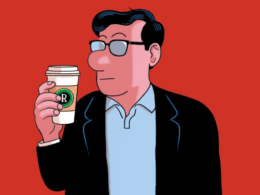Unlock the Editor’s Digest for free
Roula Khalaf, Editor of the FT, selects her favourite stories in this weekly newsletter.
The founder of the private equity owner of AC Milan football club has predicted the sports sector can cope with the new US tariff regime but warned that if the trade war escalated it would not be immune to a damaging decline in consumer confidence and spending.
Gerry Cardinale, managing partner and chief investment officer of RedBird Capital Partners, acknowledged that escalation in the trade war sparked by US President Donald Trump would hit sport indirectly through its effect on consumers. But he said sports operations had proved “resilient” in past downturns, including the 2008 global financial crisis and the coronavirus pandemic.
Cardinale, a former partner at Goldman Sachs, was one of a series of figures associated with sports businesses who said the sector was in a good position to withstand the challenges of the US president’s tariff regime.
Trump on April 9 imposed tariffs of 125 per cent on all Chinese exports to the US, prompting Beijing on Friday to impose similar levies on US exports to China. The president has delayed many tariffs on other countries but has retained a 10 per cent levy on most goods from countries other than China — and special, higher duties on imports of cars, steel and aluminium.
Cardinale said it was necessary to “look through the value chain” to understand the impact of a tariff war on different segments of the sports ecosystem.
“The pressure point in the sports ecosystem is going to be really around the consumer first and foremost,” Cardinale said.
Cardinale acknowledged there would be problems because consumers would have less money to spend on tickets and media subscriptions. But he predicted wealthier customers would still be willing to pay for high-end hospitality packages and to use VIP suites.
“At the very high premium end, I think that’s relatively income inelastic,” Cardinale said. “People that can afford those premium prices pre-tariff are going to be able to afford the prices post-tariff.”
For other consumers, however, their discretionary income formed a vital part of their finances, Cardinale added. “They’re likely to cut back,” he said. “That’ll be an issue that will ripple through the value chain.”
Cardinale’s assessment reflects a widespread view within the sports sector that it is relatively insulated from the direct effects of tariffs, which are imposed on physical goods.
There have been some concerns about the effects of the new levies on clubs’ and leagues’ merchandise sales and warnings about the potential effect of tariffs on projects to build new stadiums and other infrastructure. But the sector largely depends on lengthy media rights and sponsorship contracts, as well as revenue from ticket sales.
Vasu Kulkarni, a partner at early-stagesports-focused fund Courtside Ventures, said the sector had weathered past economic downturns because of the loyalty of fans.
“Nobody stops watching sports, no matter how bad things get,” Kulkarni said.
Private investment firm Arctos Partners last week wrote in a report that sport enjoyed a “lack of correlation”, meaning teams’ fortunes did not move in step with the wider economy. The firm has built up a portfolio of shares in sports teams.
“With long-term contracts, domestic supply chains and a uniquely loyal customer base, the business of sport continues to offer something that is in short supply elsewhere: predictability, resiliency and a lack of correlation,” it wrote.
Kulkarni predicted that professional sports investors and very wealthy individuals would continue pouring capital into sport. That trend has become particularly pronounced since the pandemic wrecked the finances of many sports operations, leaving them needing new capital.
“We believe there’s always five billionaires who are in line to purchase the next sports team that comes up,” said Kulkarni.

Cardinale has previously warned of “massively inflated” valuations in sport. While he believes valuations will generally hold up, he said he expected some lessening of rich investors’ appetite for the sector. He said that would be “a positive cleansing”.
“Guys who jump in because everything keeps going up — they’re going to be the first to leave,” Cardinale said.
Arctos’s report, meanwhile, warned of the elevated risks facing sports operations undertaking big physical investments.
Arctos owns minority stakes in the Los Angeles Dodgers baseball franchise, the Golden State Warriors basketball team and the French football club Paris Saint-Germain, among others.
Problems for stadium developments could hit teams’ finances because such projects are often intended to help the operation increase its revenues.
The report said projects already under construction were unlikely to suffer “material budget shocks”.
But it added: “Those in early planning stages — where supply chains are not yet locked in — could face cost pressure depending on the tariff regime in place.”
Source link









